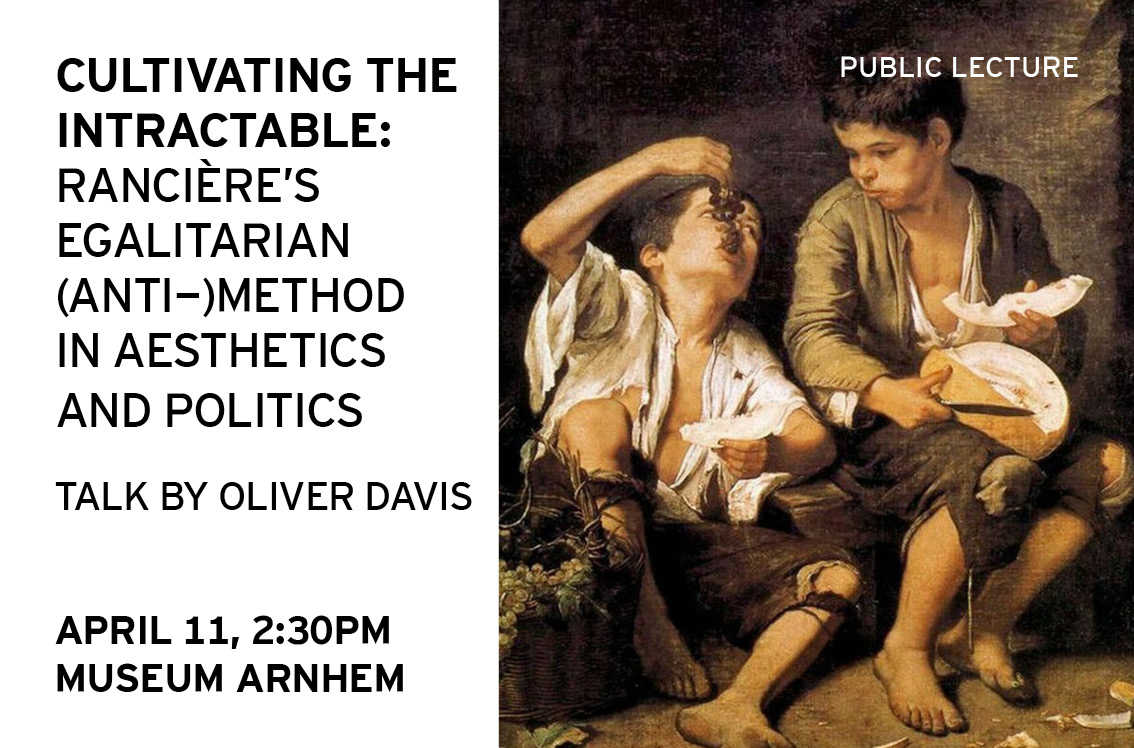Friday April 11 at 2:30pm ~ Jorinde Seijdel invites Oliver Davis for a talk, kindly hosted by Museum Arnhem.
Oliver Davis is invited to come to the DAI upon invitation by Jorinde Seijdel in the context of her seminar Illegal Acts
You are welcome to join us at:
Museum Arnhem (formerly MMKA)
Utrechtseweg 87
6812 AA Arnhem
Free entrance for ArtEZ-students
Cultivating The Intractable: Rancière's egalitarian (anti-)method in aesthetics and politics
Oliver Davis' talk will begin by reconstructing Rancière's distinctive conception of equality, by noting what he considers to be the most salient features of his account of politics and rehearsing some of the decisive moves and moments in his exploration of 'the aesthetic regime of art'. He will then focus closely on two of the fourteen 'scenes' from his latest major work on art and aesthetics, Aisthesis: Scenes From the Aesthetic Regime of Art (Verso, 2013), in an attempt to draw out and critique some of the distinctive traits of that book's project, before going on to extrapolate a fifteenth scene, set in 2014 on Seguin Island in the River Seine. Somewhat paradoxically for such a talk Davis' emphasis throughout will be less on that which may easily be 'shared' in Rancière's (anti-)method and more on the tenacious precision with which it cultivates an intractability resistant both to exchange and governance. He will end by discussing some of the political and aesthetic ramifications of this intractability.
Oliver Davis teaches in the Department of French Studies at Warwick University (UK) and is currently also Programme Director of Warwick's Centre for Research in Philosophy, Literature and the Arts. He is the author of the critical introduction Jacques Rancière (Polity, 2010), of which a German translation is due to be published by Turia + Kant later this year. His edited volume of new critical essays, Rancière Now (Polity, 2013), was published last autumn and includes a new dialogue between Jean-Luc Nancy and Jacques Rancière and a new interview with Rancière concerned mainly with his latest major work, Aisthesis (Galilée, 2011/Verso, 2013), as well as pieces by Tom Conley, Carolyn Steedman, Sabine Prokhoris, Joseph J. Tanke and Jeremy F. Lane, among other contributors. Also of interest to this audience may be the short article, 'Jacques Rancière et l'art contemporain : un échange d'histoires d'amour et de tyrannicide / Jacques Rancière and Contemporary Art: Swapping Stories of Love and Tyrannicide', Critique d'art 41 (Spring-Summer 2013), pp. 14-30 and an earlier interview with Rancière, 'Re-visions: remarks on the love of cinema: An interview with Jacques Rancière by Oliver Davis', The Journal of Visual Culture 10, 3 (December 2011), 294-304. Invigorated by this explicatory and critical focus on Rancière's thought, Oliver's other research and teaching ranges very widely across twentieth-century and contemporary French philosophy of the Continental tradition, aesthetics, critical theory, queer theory and contemporary French literature. He is currently developing new work on the policing function.
Website (including full list of publications): http://www2.warwick.ac.uk/fac/arts/french/staff/od/

